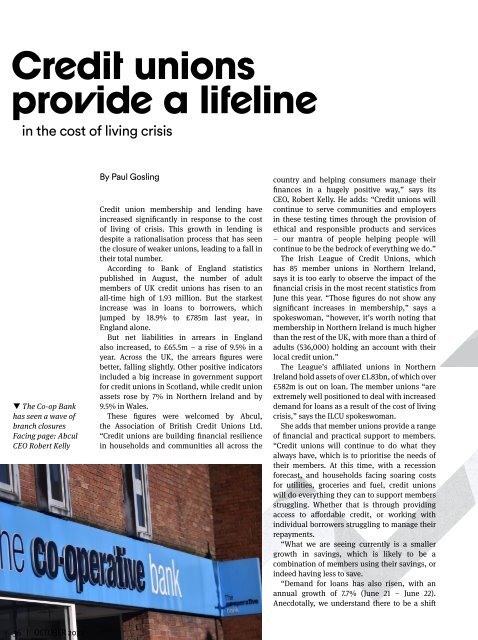October 2022 digital edition
Create successful ePaper yourself
Turn your PDF publications into a flip-book with our unique Google optimized e-Paper software.
Credit unions<br />
provide a lifeline<br />
in the cost of living crisis<br />
q The Co-op Bank<br />
has seen a wave of<br />
branch closures<br />
Facing page: Abcul<br />
CEO Robert Kelly<br />
By Paul Gosling<br />
Credit union membership and lending have<br />
increased significantly in response to the cost<br />
of living of crisis. This growth in lending is<br />
despite a rationalisation process that has seen<br />
the closure of weaker unions, leading to a fall in<br />
their total number.<br />
According to Bank of England statistics<br />
published in August, the number of adult<br />
members of UK credit unions has risen to an<br />
all-time high of 1.93 million. But the starkest<br />
increase was in loans to borrowers, which<br />
jumped by 18.9% to £785m last year, in<br />
England alone.<br />
But net liabilities in arrears in England<br />
also increased, to £65.5m – a rise of 9.5% in a<br />
year. Across the UK, the arrears figures were<br />
better, falling slightly. Other positive indicators<br />
included a big increase in government support<br />
for credit unions in Scotland, while credit union<br />
assets rose by 7% in Northern Ireland and by<br />
9.5% in Wales.<br />
These figures were welcomed by Abcul,<br />
the Association of British Credit Unions Ltd.<br />
“Credit unions are building financial resilience<br />
in households and communities all across the<br />
country and helping consumers manage their<br />
finances in a hugely positive way,” says its<br />
CEO, Robert Kelly. He adds: “Credit unions will<br />
continue to serve communities and employers<br />
in these testing times through the provision of<br />
ethical and responsible products and services<br />
– our mantra of people helping people will<br />
continue to be the bedrock of everything we do.”<br />
The Irish League of Credit Unions, which<br />
has 85 member unions in Northern Ireland,<br />
says it is too early to observe the impact of the<br />
financial crisis in the most recent statistics from<br />
June this year. “Those figures do not show any<br />
significant increases in membership,” says a<br />
spokeswoman, “however, it’s worth noting that<br />
membership in Northern Ireland is much higher<br />
than the rest of the UK, with more than a third of<br />
adults (536,000) holding an account with their<br />
local credit union.”<br />
The League’s affiliated unions in Northern<br />
Ireland hold assets of over £1.83bn, of which over<br />
£582m is out on loan. The member unions “are<br />
extremely well positioned to deal with increased<br />
demand for loans as a result of the cost of living<br />
crisis,” says the ILCU spokeswoman.<br />
She adds that member unions provide a range<br />
of financial and practical support to members.<br />
“Credit unions will continue to do what they<br />
always have, which is to prioritise the needs of<br />
their members. At this time, with a recession<br />
forecast, and households facing soaring costs<br />
for utilities, groceries and fuel, credit unions<br />
will do everything they can to support members<br />
struggling. Whether that is through providing<br />
access to affordable credit, or working with<br />
individual borrowers struggling to manage their<br />
repayments.<br />
“What we are seeing currently is a smaller<br />
growth in savings, which is likely to be a<br />
combination of members using their savings, or<br />
indeed having less to save.<br />
“Demand for loans has also risen, with an<br />
annual growth of 7.7% (June 21 – June 22).<br />
Anecdotally, we understand there to be a shift<br />
36 | OCTOBER <strong>2022</strong>

















